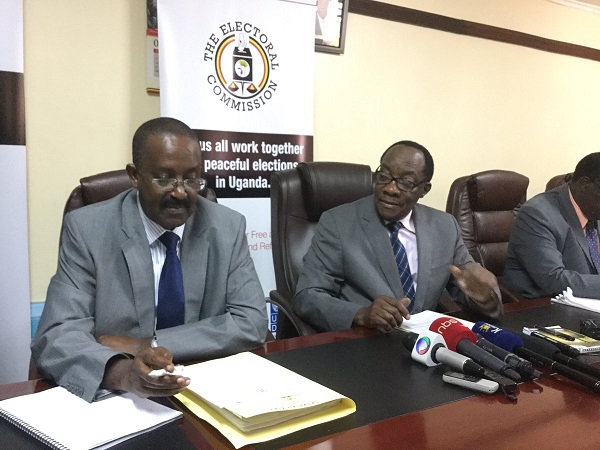
Makerere Political Science Don Sabiiti Makara also says anyone who would think election troubles would end with Kigundu is mistaken.
“The personalities are not the problem,” he says. “The problem is the procedure of appointing them. If Museveni is going to participate in the elections, I think it is wrong as a matter of principle to solely appoint the commission. If you have the powers to appoint and disappoint, the appointed will pay allegiance to the appointing authority.”
Makara says a thorough scrutiny of individuals should have taken place; especially by the Judicial Service Commission which scrutinises Judges.
He says the appointment of commissioners should even be more rigorous than that of Judges.
The Electoral Commission, Makara says, is much more critical because the president has direct interests.
“The constitution gives a sitting president immunity to Judicial Proceedings,” he says, “so while the Electoral Commission presides over activities in which the President is directly involved, the Judges don’t.”
Ignored electoral reform proposals
What seems to be enraging Ugandans even more than fearing the Electoral Commission will not serve their interests, is the fact that Museveni ignored the proposals that were gathered nationwide by political parties and Civil Society Organisations in the run up to the 2016 elections.
The proposals that were contained in what was termed as the `Citizens Compact’ included overhauling the Electoral Commission and changing the recruitment process. The proposers wanted it to be an open process where the interested candidates are vetted by the Judicial Service Commission before sending the names to the President who sends the nominees to Parliament for the final approval.
When they were presented to Parliament last year, government argued there was no time to debate all those reforms since the political tenure was coming to the end.
Opposition members say they hoped recruiting a new commission would offer the perfect opportunity to effect these reforms. They say the disregard of these proposals by President Museveni is a slap in the face and shows how the President holds Ugandans in contempt.
“The President has branded the stakeholders who conducted a nationwide survey about electoral reforms irrelevant,” says Makara.
This, Makara says, will raise more questions of their impartiality and will worsen the credibility challenge that the Commission has been grappling with.
“Apart from the [Stephen] Akabwai Commission which presided over the 1996 elections,” he says, “all the subsequent commissions haven’t passed the credibility test. According to the studies I have participated in, many Ugandans feel that the subsequent commissions have been biased and serving the interests of one person.”
Kaheru agrees with Makara. He says that by ignoring the people’s voices, Museveni is putting the commission in more trouble with the electorate.
“For us to clean the stage for them,” Kaheru says, “we must implement the comprehensive electoral reforms that civil society, political parties and all other stakeholders have called for.”
He adds: “What these reforms will do is strengthen the institutional framework of the EC to effectively deliver on its mandate without any form of pressures. As it is now, it might be merely a case of putting new wine in old wineskins.”
Mao warned on Social media that “by ignoring calls for dialogue on electoral reforms and appointing new EC under existing laws, Museveni is treating a cancer using Vaseline.”
But the voice that Museveni is disregarding this time is not just that of the people. He is also disregarding the directives of the highest court of the land.
In their detailed judgment on the Presidential election petition in which former Prime Minister Amama Mbabazi had challenged Museveni’s victory, Supreme Court instructed government to put into effect the recommended electoral reforms.
The Court has been making recommendations which government has been ignoring but it this time demanded that the Attorney General follows up on those directives and reports back.
The test now remains with Parliament which has the ultimate task of approving the nominees. While some expect it to remind Museveni of the proposals that incorporated the views of all Ugandans and the Supreme Court Judgment, others like Sewakiryanga are not optimistic.
He says there is nothing that can be expected from this Parliament which in its first months proved that the only needs that matter are those concerning their welfare.
Without Parliament’s intervention, many observers predict a much gloomier picture as far as electoral democracy is concerned.
Others like renowned lawyer Robert Kirunda, however, think the new commission is being judged harshly. He thinks Ugandans should give the new team the benefit of the doubt and judge them basing on their performance.
“I think it is too early to tell whether this commission will perform any differently from the previous one or not.”
While he says it will not be smooth sailing for them given the challenges and tasks that lie ahead of them, he cautions Ugandans to be fair in their judgment.
He says the criticism of the commissioners especially the incoming chairman is unfair and is based on an entirely different issue.
“I think people have been unfair to the incoming EC chairman,” Kirunda says, “If you want to criticise him, talk about his character, his credibility or his competency but don’t attack a man’s integrity based on his role in only one case when he prosecuted hundreds of cases.”
He adds: “Prosecutors act on the evidence given to them by the police, so he didn’t gather the evidence, he was given evidence and he acted on it.”
He is of the view that any criticism of the new EC team should be challenging their qualifications and capabilities but not based on the roles they previously played.
But the agitated Ugandans might not heed Kirunda’s advice. Forum for Democratic Change Party has already announced activities and rallies to begin afresh the fight for electoral reforms.
 The Independent Uganda: You get the Truth we Pay the Price
The Independent Uganda: You get the Truth we Pay the Price



